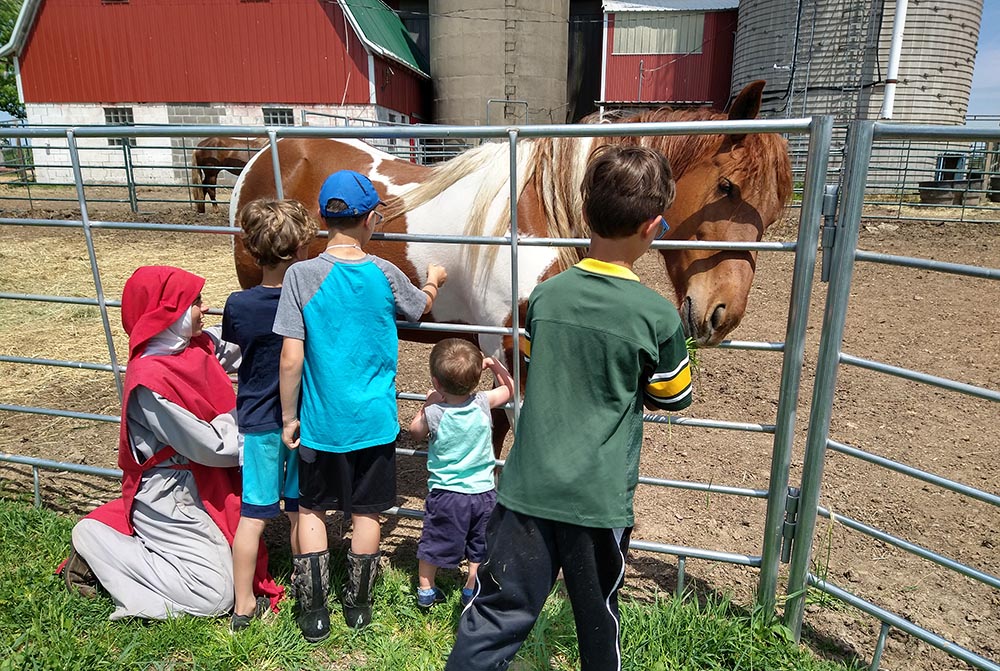
Children visit the Merciful Heart of Jesus Farm outside Marshfield, Wisconsin. The Franciscan Association of Divine Mercy formally organized in 2019, after Mother Mary Veronica Fitch received permission to pursue the new community. (Courtesy of Mary Veronica Fitch)
Editor's note: "Evolving Religious Life," a new series from Global Sisters Report, is exploring how Catholic sisters are adapting to the realities of congregations in transition and new forms of religious life. While we write often about these trends, this particular series will focus more closely on sisters' hopes for the future.
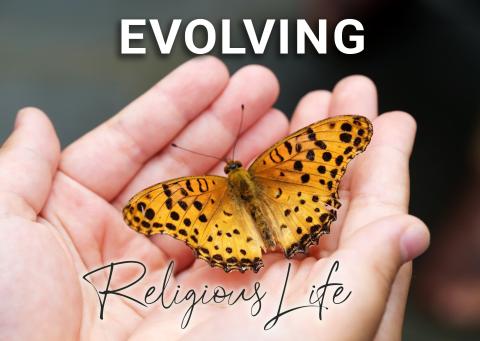
Frozen ground dulls footfalls that cross swiftly from the house to the barn on bitter winter mornings at Merciful Heart of Jesus Farm.
It's just after 5 a.m., and though Mother Mary Veronica Fitch doesn't welcome the cold, she relishes looking after her charges.
There's Majesty, Mercy, Trinity and Unity — the barn cats that do their good work in the rafters and stalls.
Horses Agatha, Agnes, Anthony, Catherine, Cecilia, Colette, Ignatius, Lucy, Maria and Margaret Mary wait in anticipation for the woman who brings fresh food, water and gentle, easy chatter.
And rounding out the pack is Faith, Fitch's faithful canine shadow who follows her throughout the day's chores.
Farm life is familiar to many in and around Marshfield, Wisconsin, a small city of about 19,000 that is exactly equidistant between Green Bay and Eau Claire, in the center of the state. Since 2019, it's been home to the Franciscan Congregation of Divine Mercy, an order organized in fall 2016, after Fitch received permission from LaCrosse Bishop William Callahan to explore the possibility of establishing the new ministry.
Fitch's path, she acknowledges, is anything but straight.
"My story is kind of complicated," she said.
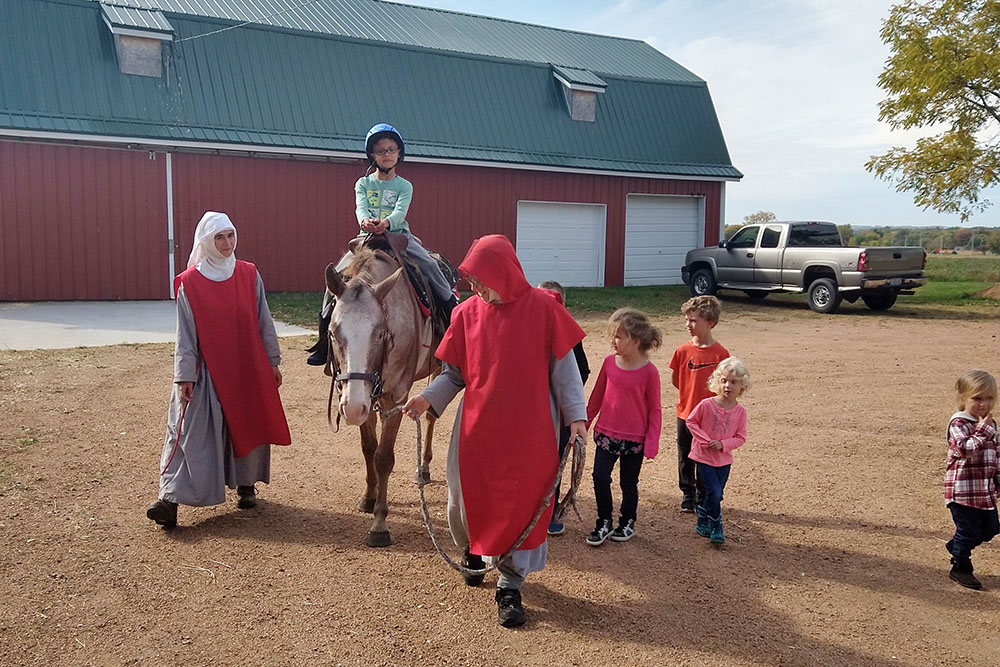
Connecting with animals and spending time with the women of the Franciscan Association of Divine Mercy is just part of the ministry offered to children and adults who visit the Merciful Heart of Jesus Farm. Foundress Mother Mary Veronica Fitch and Sr. Maria Lucia Schnaufer also work with guests and visitors to build a more profound faith life. (Courtesy of Mary Veronica Fitch)
Fitch assumed her adult life would include animals. As a girl, she was "horse and dog crazy" and spent as much time as she could learning about animal welfare, even working throughout high school with a local veterinarian.
Once in college, she saved enough money for Monty, an Appaloosa horse she rented for years before having the chance to buy him. When she was 19, her parents bought a farm they had longed for, and she went to work for them caring for the Arabian horses they were raising.
As her hands worked the horses, her heart and mind drifted to other things. She happened one day to watch a documentary about Our Lady of Fátima, and she was struck by the story.
"In that movie, Our Lady said our souls are going to hell because there is nobody making sacrifices for them. I guess it was kind of a call. I might as well have raised my spiritual hand and said, 'Me! I'll make sacrifices to save souls!' "
Her service on the farm continued with the horses and she soon came to work with Frederick, an Arabian stallion who Fitch said was a natural-born therapy horse.
"He was very charismatic. He had a sensitivity toward people in suffering or those handicapped," Fitch said.
The compassion between the horse and the people he encountered took root somewhere deep in Fitch's soul. It was also about that time that she began to seriously consider religious life. But how it might happen was unclear. Her parents were aging, and they sold their larger farm to move to a smaller place with fewer horses.
Advertisement
When she was 26, she began working in earnest to find a religious community to join. After several years and much consideration, Fitch ultimately devoted herself to life with the Poor Clares, and in 2000, happily settled into the order.
But something was missing.
Mercy in movement
For years, Fitch carried a copy of the diary of St. Maria Faustina Kowalska, a member of the Congregation of Sisters of Our Lady of Mercy in Poland in the 1930s. Kowalska had limited education and worked primarily in the kitchen and garden at the convent.
But the young nun received revelations from Jesus, and she recorded those messages of God's divine mercy in notebooks that became her diary — a book that sparked a renewed movement focusing on the mercy of Christ.
The messages spoke to Fitch, who for years read the passages and felt called to act, but didn't know how. She set the ideas aside to join the Poor Clares, but in 2014, Fitch realized the words wouldn't wait.
"I had a call, but I would push it away and reason it away," she said. "From 2014 to 2016, it got insistent, really high pitched. It became absolutely unbearable not to do something with it."
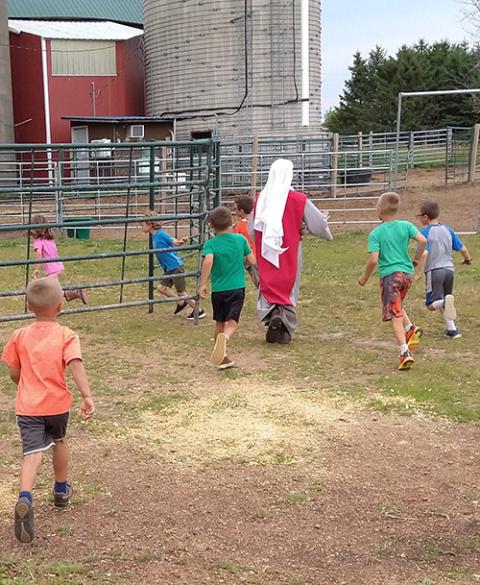
Children spend time with Sr. Maria Lucia Schnaufer, visiting the barns and pens at the Merciful Heart of Jesus Farm outside Marshfield, Wisconsin. (Courtesy of Mary Veronica Fitch)
Fitch petitioned first her order, then the local bishop, for permission to establish a new order, and pursue her idea of the Divine Mercy community. And while she didn't have all the answers immediately, she knew animal therapy would play a significant role in the community's outreach and engagement.
The congregation, Fitch explained, is an association consisting of consecrated women, clergy, other religious, and laypeople who try to live mercy daily. There are three specific aspects of the community: a monastic-contemplative branch, a monastic-apostolic branch and a fraternity branch.
"When I got permission to go, I woke up in the middle of the night and said, 'A dog. I have to get a dog,' " she said.
Fitch found temporary quarters for the community in 2016, and then in 2019, after years of seed planting, the Franciscan Association of Divine Mercy was given land from a local farming family for its permanent home.
The Merciful Heart of Jesus Farm was born.
On 32 acres, with a house, barn and small orchard, the farm is the physical manifestation of a call that rooted in Fitch's soul decades before. It's a place that brings peace to its inhabitants, the volunteers who work with Fitch and Sr. Maria Lucia Schnaufer, currently the community's only other member, and the greater Marshfield area.
Schnaufer said prayer is central to the work, which she views through a humble lens.
"The irony is that we're giving our lives to help people grow closer to God, but there's such a gift that every person brings when they come to the farm," she said. "There's certainly something unique that's offered here."
Local elementary school teacher and coach Peggy Empey, a farm volunteer, agrees.
"Going to the farm, there is such a peaceful presence. When you go there, you're there," Empey said. "Working with the animals, you are able to just be in the moment. The rest of the world can do its thing, but you are there."
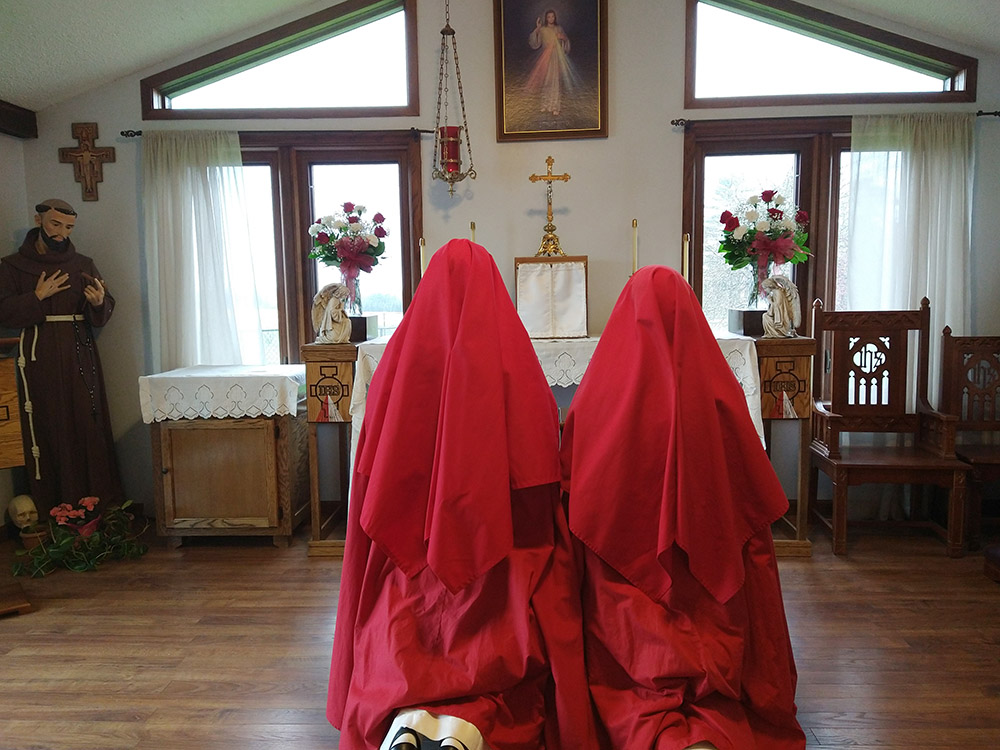
Mother Mary Veronica Fitch and Sr. Maria Lucia Schnaufer pray in the chapel at the Merciful Heart of Jesus Farm. The women have morning, midday and early evening prayers, vespers and they pray the rosary and the Divine Mercy chaplet. "We're blessed to have a little chapel in our house," Schnaufer said. (Courtesy of Mary Veronica Fitch)
Empey first came to know of the farm after her son volunteered there. He spoke well of the sisters and their work, and Empey was eager to learn more.
But it was during a faith formation weekend where Empey really began to lean into the teachings of the Divine Mercy of Jesus and she began praying the Divine Mercy chaplet. The series of prayers were what she turned to when her father became ill, and it provided an opportunity for Empey to talk with him, a lifelong but private Catholic, about faith.
"He didn't necessarily want to talk about God outside of church," Empey said. "He was a faithful believer, but it was not something he was comfortable talking about."
But Roger Hartl's illness caused many sleepless nights. And in those restless hours, Empey said, she and her dad talked, prayed the chaplet together, and became closer than ever.
That pattern repeated itself a few years later when Empey's mother, Clara, was ill. The chaplet, and Fitch and Schnaufer's commitment to Divine Mercy were all Empey needed to know she found something special.
"It truly is what pulled me in," Empey said. "The gift that they are bringing to our area is giving people an opportunity to spend time with Mother and Sister — for me it's been a huge gift in my life."
Fitch rejects any of the credit.
"I'm simply trying to do what God is asking me to do," she said. "Service needs to be talked about more. So many people would be capable of so much more if we talked about it more often, presented it in a way that can be understood, and see it lived, too.
"It's a wonderful thing to live God's will."




